At Juris Digital we help law firms rank in Google’s local search results and localized organic results for competitive practice area keywords in very competitive markets.
Ranking in the Google’s local search results your clients are already looking for you might provide the highest ROI of any of your marketing channels. Once you rank in these results for important keywords you will start seeing more qualified leads and signing more cases.
The process of getting ranked here is known as local SEO for lawyers. It’s the only law firm SEO guide you need to start earning free clicks and signing more cases.
If you’re looking for local SEO services for law firms, contact us for a free marketing analysis.
But if you’re ready to dive in this article will serve as a guide to local SEO for law firms. Now let’s get started!
But what is the local pack anyway?
Below is a visual example of what we’re talking about regarding Local SEO. You may have heard this called the 3 pack and some people refer to it as the map pack although that’s a different view altogether.
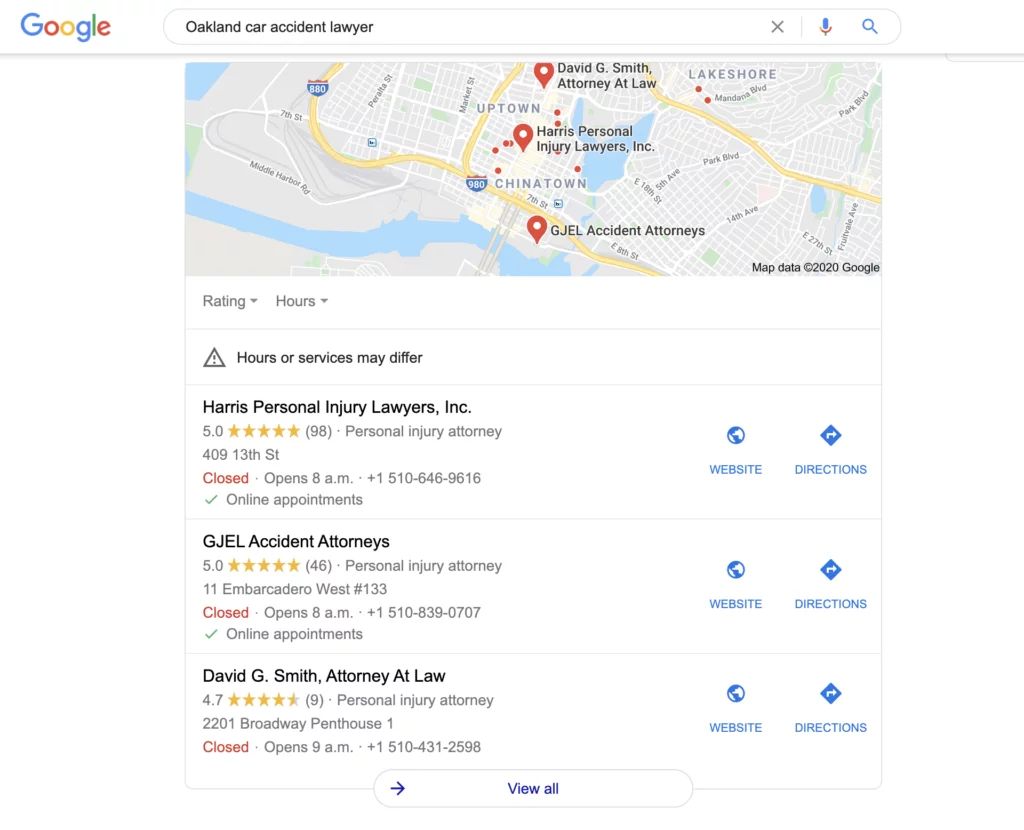
In this guide we are going to cover how your law firm can rank for important keywords in your market and sign more cases.
This is the complete and most comprehensive guide covering Local SEO Services for Law firms on the internet.
In this guide we will cover everything you need to know from start to finish to optimize your Google Business Profile (Previously called Google My Business / Google Places)
How Google Ranks The Best Firms in Local Search
Put simply, Google recognizes authority in local search by measuring three factors: relevance, proximity, and authority. Google needs a way to identify which law firm websites deserve to rank above others.
Here are how these three factors are defined in attorney local SEO:
- Relevance (is the content on your domain relevant to the searcher?);
- Proximity (is your business located to the physical location of the person conducting the search?); and
- Authority (your overall website authority is gauged by many things including content quality, site speed, and links from other websites).
In reality Google uses hundreds of different ranking signals, all of which carry a different weight. Factors related to user experience, such as site speed, relevance, and well-written content are essential.
If you are doing things the right way and earn authority, you will have the ability to rank for important keywords. Now let’s look at the different type of keywords you have the opportunity to rank for.
How Potential Clients Are Finding Your Law Firm Online
When someone conducts a search in Google, they will type in a keyword. A keyword can be one-word, multiple words, or a sentence. These are sometimes referred to as key-phrases as well.
Here are two different types of keyword potential clients might type into a search engine, and it’s how we will refer to them moving forward in this book.

Car Accident Lawyer – this is a transactional keyword where a potential client is likely to be at the bottom of the funnel looking to find a car accident lawyer. People also call these “money keywords” or “head keywords”. There are also many variants of these such as:
- City / State Car Accident Lawyer
- Car Accident Lawyer Near me
- Best car accident lawyer
- And the list goes on….
Then there are long tail keywords like: Do I Need a Lawyer After My Car Accident? – this is a question-based keyword that is more at the top of the marketing funnel. This potential client has not yet decided if they need to hire a lawyer and is doing research. These are typically called “long tail keywords”.
Where Your Law Firm Can Rank in Local Search Results
Here is where your firm has the opportunity to rank in a standard search results page:
Local Service Ads: These are new for attorneys and it’s offered through Google’s
Local Service Ads product which is a pay per lead service. This is different from local SEO for law firms.
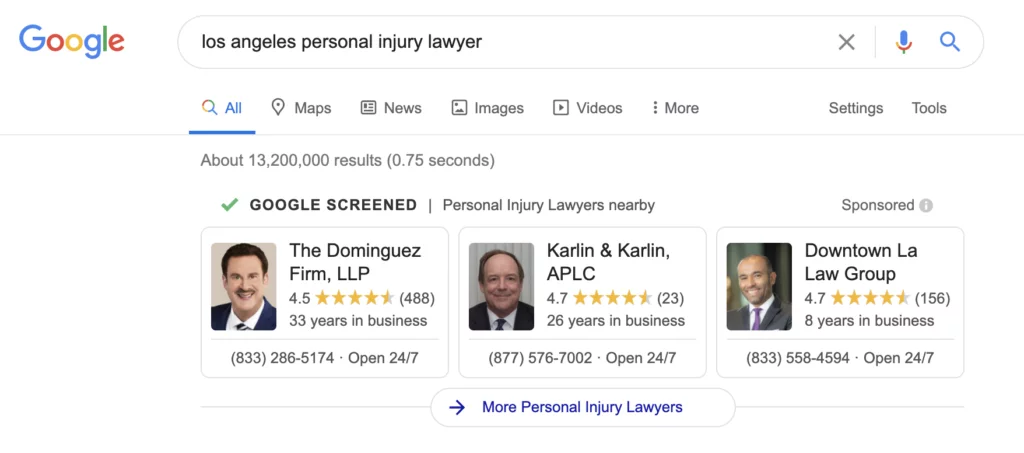
Paid ads (also called Google Ads, Pay Per Click [PPC], or Search Engine Marketing [SEM]) – these are marked by green “ad” text as shown below. These ads show up at the top of the Google Search Results page.
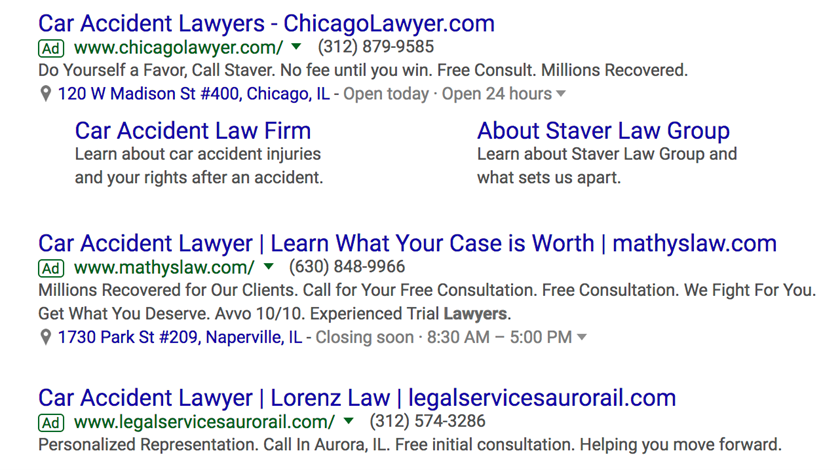
The local pack (also called the local pack or local results) – Sometimes four results will show here if there is an advertisement in the 3-pack. It will be marked by an “ad” text.
These typically display underneath the paid ads when a search query has local intent. Please note that some keyword searches will not contain a 3-pack. If you search for a longer tail keyword or a non-transactional keyword, you might not see a 3-pack in the search results at all.
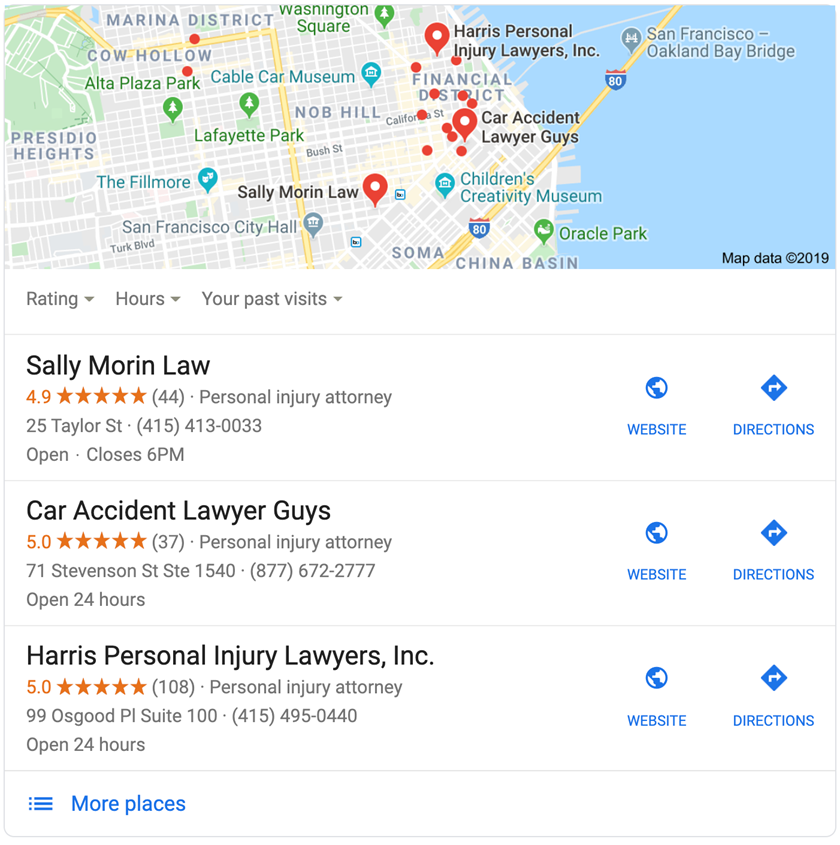
Organic results(these are the blue links) – the organic results typically display underneath the 3-pack. There are usually 8–11 of these that will show up in a search. Organic search results typically take up most of the search real estate.
Many results that rank in organic search results will show up based on the location you are conducting the search from.
This means that if I search “Personal Injury Lawyer” from Houston and Boston I will see results for the city closest to me blended with some national rankings (firms that rank everywhere).
An example of traditional organic results are below:
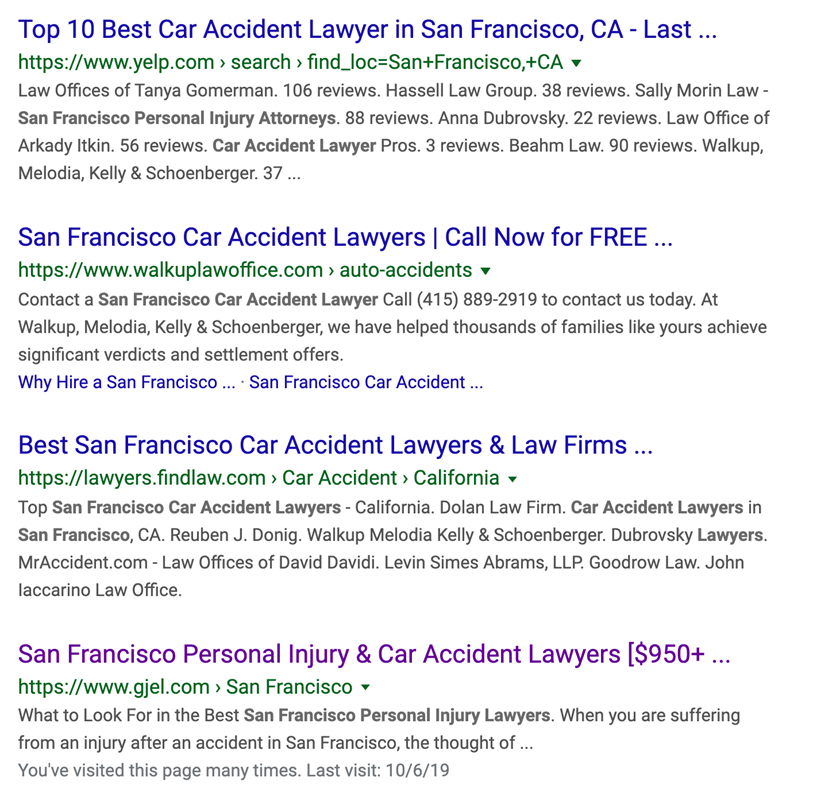
The Local Finder – if you were to click on a local pack listing on a computer, you would be taken to a longer list of law firms. This is called the local finder and it’s where all local results for that search query are displayed, along with ads. Ranking here is important for legal SEO. You can see an example of ads in the top two firms in the local finder below.
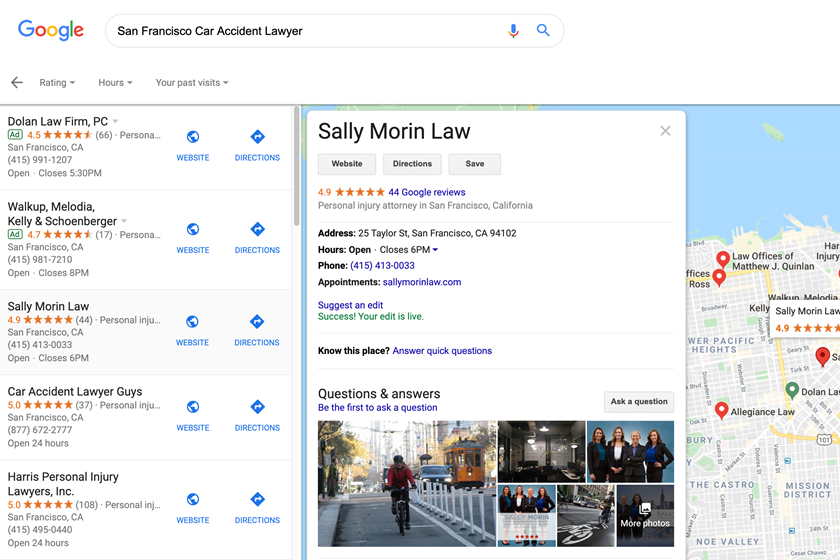
Potential clients can also search from the Google Maps website or phone app, where the display of the results may differ from the 3-pack and local finder even though the data is all connected through your Google Business Profile (Previously called Google My Business).
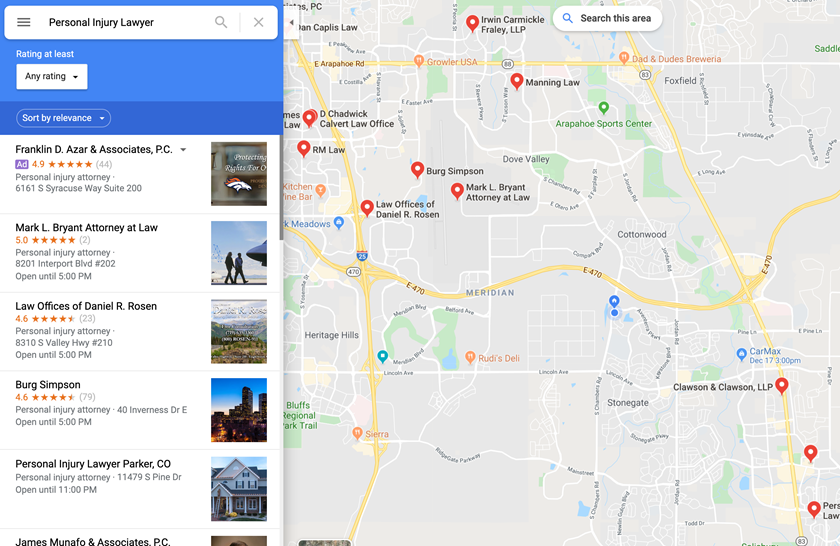
Other features can show up in search results. These include features like:
Answer boxes:
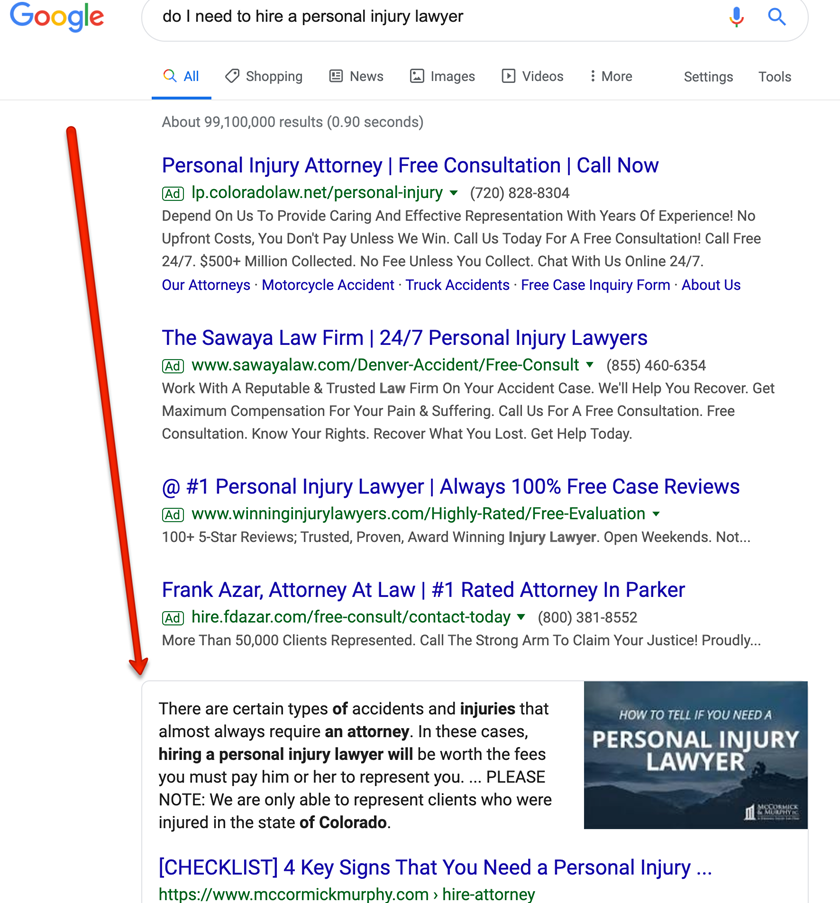
Featured snippets:
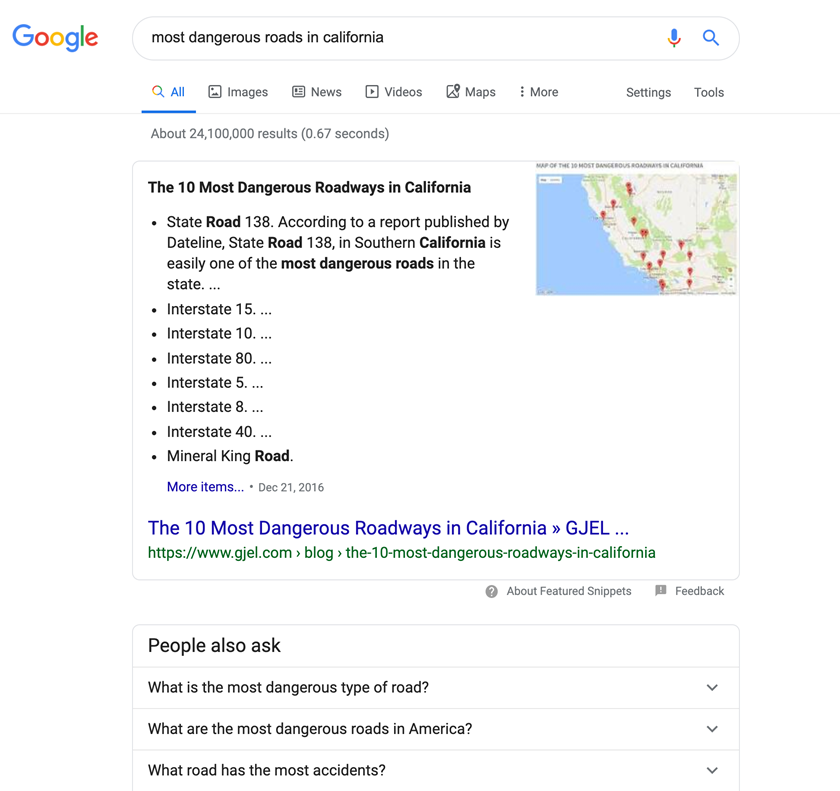
Google Maps:

There are also a variety of search features that can enhance your click through rate (CTR) on your organic rankings above that of your competitors. These include features like:
Review schema — will appear in organic search results if you add a piece of code to the HTML on your page.
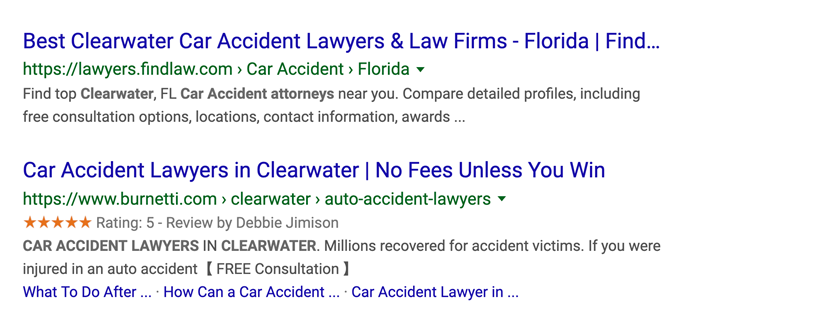
FAQ Schema — is also a piece of code you can add to specific pages to take up more search real estate.
There are more features, but those listed above are the most important to know about for now. Also, it’s possible to rank organically in the local pack with a featured snippet and FAQ/Review Schema.
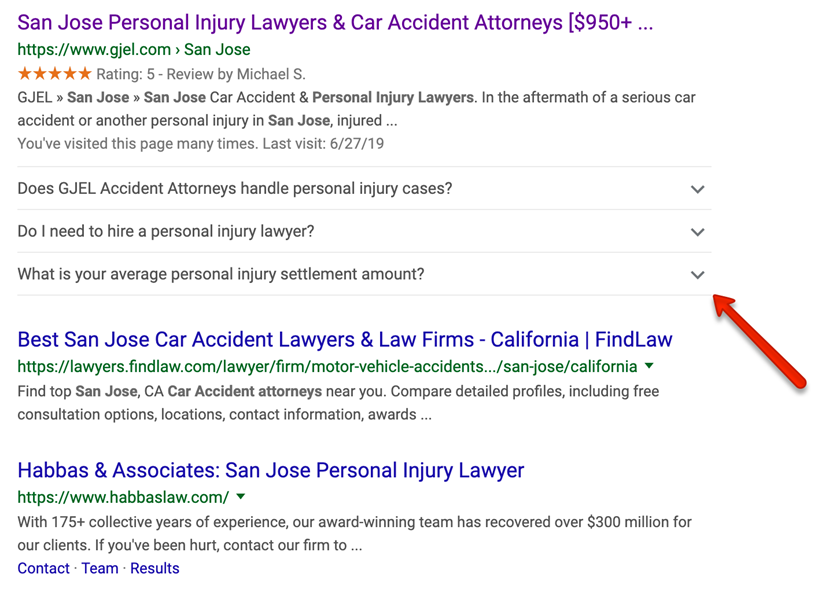
The more real estate you have in the search results, the higher your click-through rate (CTR) will be. With good local SEO for attorneys your firm can outrank your competition and increase the number of qualified leads.
How Well Can Your Firm Rank in Local Search Results?
Rank tracking is how well your law firm’s website ranks for a particular keyword. For example, if your firm ranks #1 for “car accident lawyer,” that can be a good thing. However, it’s important to know that traditional rank-tracking software can be very misleading.
Google is better than ever at understanding where a person searching online is located. They have pinpointed the searches location before they hit submit on a search. Now, the searcher’s proximity to a law firm plays a big part in which results Google decides to show.
There are a lot of choices for rank tracking software out there, and the problem with most of them is that they use a single GPS location (usually the city center) to show you where your website ranks for a certain keyword. A potential client looking for a personal injury attorney doing a Google search from a hospital may see a different #1 ranking firm than someone searching a few blocks away.
The fact is that many law firm marketers have a poor understanding of how much visibility they have in a market because of misleading traditional ranking reports. This is also dangerous for strategy development because it’s easy to focus your marketing efforts on new geographic areas, when instead, you should be focusing on a strategy that allows your firm to rank in as many places as possible within your target city.
In many cases, law firms could double, triple, or quadruple their leads just by focusing on strategies that help them dominate one geographic area instead of spreading out before they’ve reached their maximum potential.
Ranking Results Will Vary by the Physical Location of the Person Searching
To illustrate this point, let’s use a visual example.
In the map below, I’m using a tool called Local Falcon. Local Falcon allows you to visualize where you rank as if you were searching from a certain GPS location.
Do you see where “GJEL Accident Attorneys” ranks in maps results for the keyword “Car Accident Lawyer”?
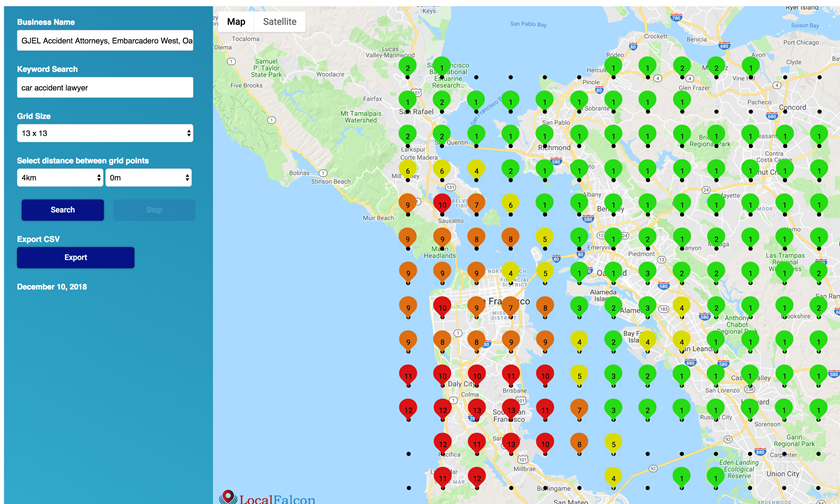
This is a competitive keyword in a competitive market (San Francisco). The colored map icons with corresponding numbers represent the ranking position if I was conducting the search from that specific geographic location.
Simply put, if I were to do the same search from two locations two blocks away from each other, I’m likely to see different results!
Notice how there are different color categories:
- Green represents ranking 1–3
- Yellow represents ranking 4–6
- Orange represents ranking 7–9
- Red represents ranking in position 10+
Each map marker is a specific place where a search is conducted. As you can see, the results are all over the place.
If you check rankings from your computer or a software that only tracks from one GPS location (which is typical) you are not getting the full picture.
In fact, you are more likely to rank for keywords in the local pack if you are searching from your office because Google may display the closest business.
This may feel rewarding, but it probably won’t generate much business if you’re not ranking well from where actual clients are looking.
Pro Tip: If you want to see where Google thinks you are physically located open up Chrome and do a Google search. Scroll to the bottom and it will tell you the location it’s showing results for.

Your Ranking Position Also Relies on Searcher Intent
Searcher intent has a lot to do with how Google decides to display local pack results. While Google is going to serve local results for many law firm keywords, they also understand when a search should be even more localized.
One example of this is if I searched for “Car Accident Lawyer” and “Car Accident Lawyer Near Me”.
The “Near Me” search is explicitly telling Google that you’re looking for a car accident lawyer in close proximity to the location you’re searching from, whereas otherwise they understand you’re probably just looking for a lawyer in your general area.
There are many different keywords a potential client might type into Google. Let’s look at a few examples and see how they differ:
Keyword searched: “Car Accident Lawyer”
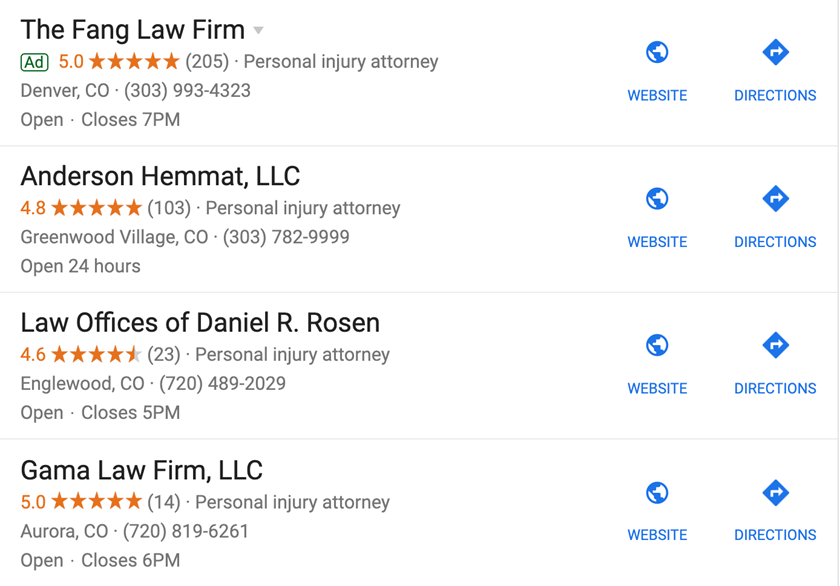
Keyword searched: “Car Accident Lawyer Near Me”
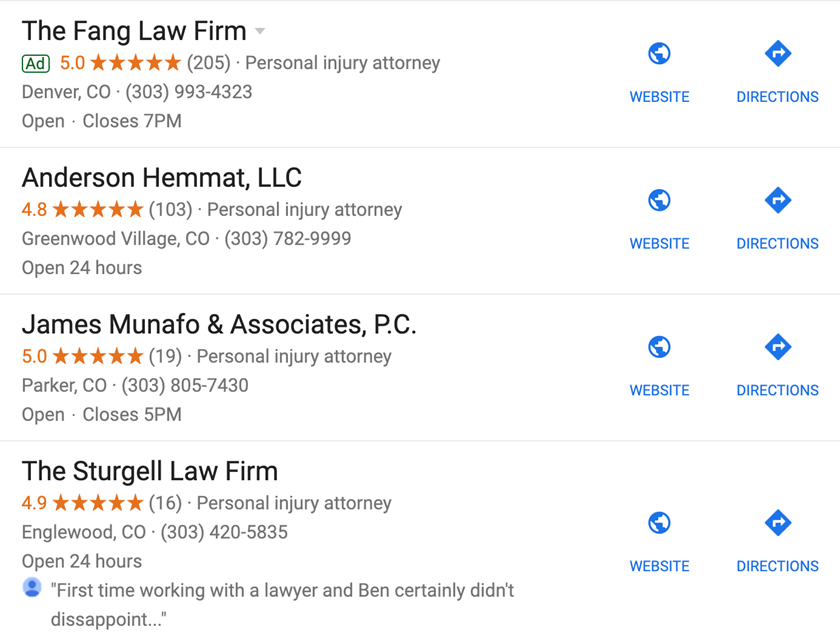
Keyword searched: “Car Accident Lawyer in Parker”
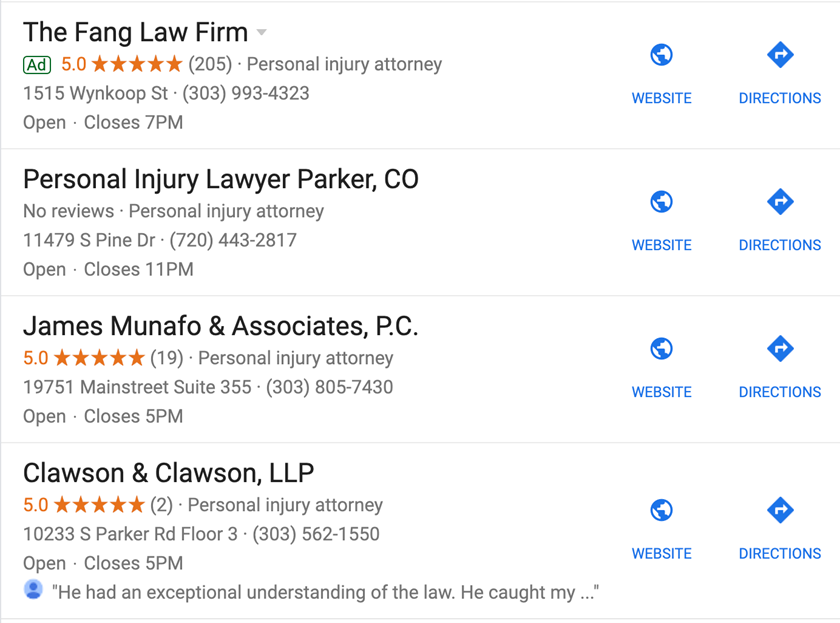
In the above examples, “The Fang Firm” showed up as an ad in all three searches. However, for the typical 3-pack results, we see a different mix of firms in each result.
All of these searches were conducted from the same place within the city on a desktop computer.
Other Ranking Factors To Consider
The type of device the user is searching from can also have an impact on how you rank. If you have a slow loading website, you are less likely to rank well on mobile search results.
Why? Google correlates slow site speed with a poor user experience, so website visitors will be more likely to bounce (or leave the page).
Google is primarily crawling the mobile version of your website to determine how they should rank your site.
Does Proximity Override Other Ranking Factors?
In my experience, the answer to this is no. At least for many important search terms that will drive a lot of new business to your law firm.
The example below is for a competitive keyword in a competitive market. If you’re able to rank organically and locally for your important keywords, you can get similar results.
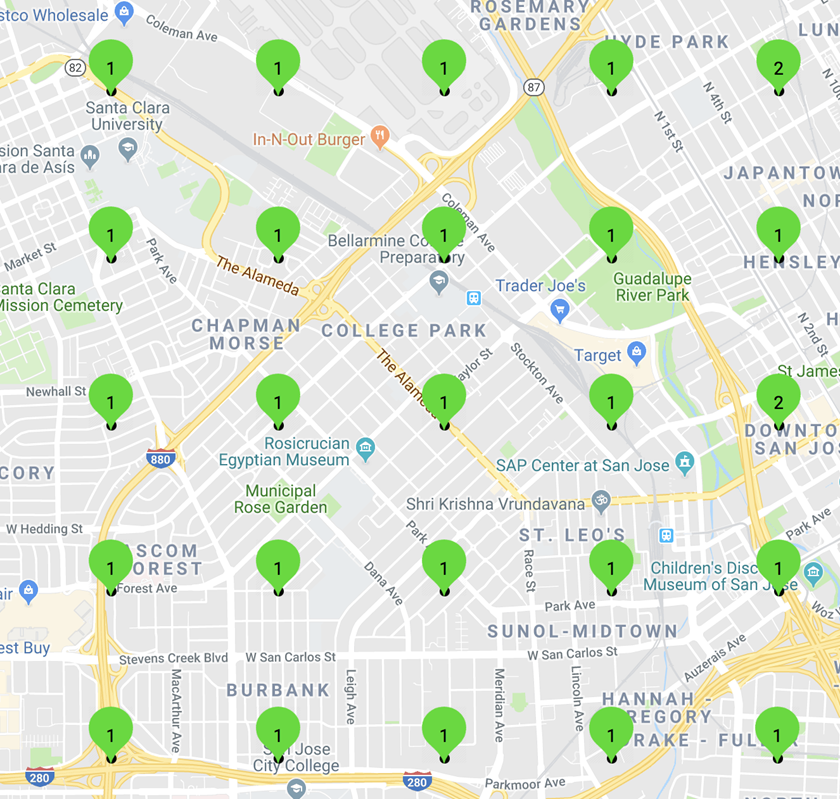
How You Can Get a Better Idea of Your Overall Visibility?
Thankfully, there are a lot of cool tools out there that help you diversify how you track rankings. You will be able to track mobile and desktop rankings by:
- Using specific addresses across a city;
- Testing all zip codes within a city to find strong and weak areas;
- Tracking rankings by cities.
There is a plethora of tools out there you can use to track rankings, but here are some that we and our clients use with success:
- Whitespark shows ranking results at the city and postal code level
- Brightlocal shows rankings by city and postal code
- Mobile Moxie allows for geographic searches by address
- Local Falcon shows the geographic map view we covered above
The Dangers of Rank Tracking in Local Search
I also feel obligated to cover the danger of rank tracking. If you are looking at your rankings daily, you will drive yourself crazy and miss the forest for the trees.
Rankings change daily, even multiple times in a day. Don’t get caught up in small tactics, instead, keep a long-term strategy in place to drive results.
Google Business Profile For New Law Firms: Tips You Need to Know
In this section we will cover things to consider if you’re opening a new law firm and you plan on using your Google Business Profile to get a step ahead of your competitors.
If you already have an established law firm, this section may not be the most important for you.
However, there are a lot of good nuggets of information in here that make it worth reading!
Choosing a Name for Your Law Firm
Whether you have an established or brand-new law firm, your business name will play an important part in how you rank in search results for important keywords that can bring your firm new business.
If you are just setting up, there is no doubt you should brand your firm in a way that will serve you long-term. The more of a niche you have, the easier this gets (e.g. Motorcycle Joe). For established firms, it’s a question for very careful consideration.
First let’s get frequently asked questions out of the way…
Does having a keyword rich business name help your business rank in in local results for that keyword?
Yes, it has a strong impact. This may be because Google wants to serve the most accurate results for brand searches. By naming your firm “Denver Car Accident Lawyers,” Google may assume that “car accident lawyers” is an integral part of your business.
Can I use a keyword for my business name on my GBP?
You should not unless you can prove that it’s your actual business name. Otherwise, you risk temporary or permanent suspension.
In fact, according to the Google Business Profile Help section, “Your name should reflect your business’ real-world name, as used consistently on your storefront, website, stationery, and as known to customers. Accurately representing your business name helps customers find your business online.”
Should you change your law firm name to a keyword rich business name?
This is something I would recommend you discuss with a branding professional to understand all of the pros and cons before making a decision, but in the meantime, here are some that come to mind.
Pros of changing your name:
- Your firm might rank for important keywords easier
- It’s clear for clients what you do
- Therefore, it might reduce bad or irrelevant calls
Cons of changing your name:
- It might dilute your brand if you’re already established
- It could send conflicting signals to Google and de-value everything
- A change could increase the chances of being flagged as spam
- It would mean building signage and business licenses will have to be changed
Although it’s a bit complicated to do the right way, there are still many cases where I recommend firms do change their name. It works best for firms that have small budgets and a lesser known brand.
My Opinion on Your Firm Name
As a marketer at heart, I have a real love for brand names and keyword rich business names. With that said, you should realize you’re up against firms who are already using keyword rich names such as these guys:
- Car Accident Lawyer Guys
- iAccidentLawyer
- El Dabe Ritter Trial Lawyers
There’s also an organic search benefit to having a keyword rich law firm name, but it’s not something that can’t be overcome by investing more into building your brand.
My very simple and general answer to whether you should have a keyword rich law firm name is:
- if you’re a new firm/just setting up then consider changing your name;
- if you’re an established firm with a strong internet marketing presence, plan on keeping your name.
Selecting and Evaluating an Office Location
If you have the option to choose where your office location, pay close attention, because this is very important.
Selecting an office location for your firm has changed over the years. Many years ago, Google used to use the city “centroid” and ranked law firms closest to that location higher in search results. Now, Google ranks law firms that are the closest to a searcher’s exact location.
You should select an office within the recognized city limits of where you want new clients.
Also, make sure there are no other competing firms in your building using the same primary category, or prepare for an uphill battle.
Do:
- Find an office with no other attorneys practicing in the same legal area
- Find an office that has a mailing address that is the same as the physical address (no PO Boxes).
Do Not:
- Use a virtual office such as Regus if you can avoid it. While these offices do sometimes contain legitimate attorney offices, many attorneys have used these to spam the system. They are flagged more frequently, plus, you will likely have another competing attorney in the same building.
- Set up an office without signage. You need signage showing your brand name if you want to get out of possible sticky suspensions in the future.
- Use an office where you cannot get physical mail. Google sometimes requires verification by postcard.
The biggest takeaway from this section is that you should not share an office building with a law firm that also takes the same type of cases.
Google will only show one of the listings in the 3-pack at the address.
If the other firm’s listing is more established, it will be a long and hard fight to overcome them.
Your Google Business Profile (previously called Google my business for lawyers) profile is your calling card for local searchers looking for something close by and tangible.
What are Google Business Profile Attributes?
GBP attributes let customers know what to expect when visiting your establishments. Take a look at the listing below and you will see Online Appointments. This is a rather new attribute allowed for Law Firms.
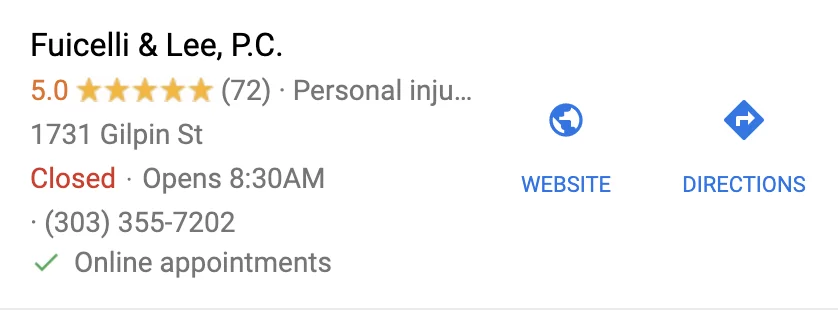
Attributes are just one step that Google is taking to help businesses meet the demands of its users.
While these attributes won’t help with your law firm organic rankings, they do have some impact on local pack rankings. If potential customers type in keywords that match your factual or subjective attributes, you may show up in that search.
What Attributes are Available
There are also two categories of attributes that merchants can display on their GMB profile, and these readily depend on your selected GMB category.
These types of attributes are:
- Factual attributes: Easily verified by Google to be true, such as “outdoor seating” or “curbside pick-up.”
- Subjective attributes: Sourced from opinions and reviews of your customers, such as “fast service” or “friendly service.”
Some of the factual attributes available to most law firms include:
- Wheelchair accessible entrance
- Wheelchair accessible elevator
- Veteran-Led
- Women-Led
- Online Appointments
- Black-owned
- LGBTQ-Friendly
- Online Events Calendar
- Restroom
- Unisex Restroom
- Mask Required
- Appointment Required
- Temperature Check Required
- Staff Wears Masks
Phone Numbers
In the past, there used to be issues tracking phone leads from your Google Business Profile. Thankfully, these days, you can track every call from a that comes through the listing.
If you already have a phone number you’re using for your office, you can keep it. But, I don’t recommend using it for your profile since you will not be able to track phone calls generated from this lead source.
If you have an existing number, you can either:
- port your number over to a call tracking service like CallRail; or
- setup a new tracking number.
At this point, I recommend setting up a new tracking number and connecting that to your listing.
Best Practices for Phone Numbers
When setting up a tracking number for your business listing, we recommend the following.
- Use a local phone number with a local area code. This is also more likely to build consumer trust.
- Setup call tracking through CallRail or another service. We will go through setting up CallRail later.
A proper phone number for your business is also a potential branding opportunity. A memorable phone number that you use across all your marketing campaigns will be helpful in the long run, but keep in mind that it will also be difficult to track the results if you use the number on multiple marketing channels.
Google Business Profile Optimization 101
Proper planning prevents piss poor performance.
There is no sense in shortcutting the work in building an effective business listing. In this section, we will discuss the specifics of everything you need to build an effective 3-pack presence.
Photo Guidelines
Having great pictures is important for your listing optimization. Pictures help build the authority of your business by proving you exist, and they increase potential client’s confidence in you.
Whatever you do though, don’t use stock photos!
Prepare everything you need up-front so the rest of the process is a breeze. This prep work will save you a lot of time later.
Here are some important points to remember for photos and videos:
- Your signage should match your business name exactly as it appears on your Google Business Profile
- Photos should be a minimum of 720 pixels x 720 pixels
- Signage should appear to be permanent and professional, so no paper signs
Most law firms do the bare minimum when it comes to uploading photos, so you will already be a few steps ahead of your competitors if you follow these guidelines.
What Photos You Should Take
As we mentioned, photos are important because they help prove that your business exists in the real world.
When Google can match exterior signage pictures with street view photos, you tend to have fewer issues. I suggest taking the following photos for your Google business profile listing:
- (5) Exterior photos showing signage (if your building has exterior signage). The photos can be from different angles. If you don’t have signage, photos of the outside are still OK because it shows that no other businesses in that building have signage either. If Google was ever to suspend your listing, having this evidence handy is helpful in getting it reinstated quickly.
- (3) Exterior or interior photos showing door signage or signage near your door (if you have door signage). These photos should clearly show your logo or business name.
- (2) Photos of your office waiting room or reception area.
- (5) Photos taken throughout your office. Showcase the office.
- (2+) Photos of staff members. These can be candid photos or professional photos.
- (1) A logo picture which is used on your local listing.
- (10) Practice area related photos. If these are stock photos that’s OK, but original photography is always better.
Videos
There are certain videos you should have on your listing also. Videos are typically harder to manipulate than photos. Video uploads are now limited to 750MB for the size of the file.
Having the following pre-recorded videos on your listing will help legitimize your business:
- (2) Exterior videos (using your camera phone is fine) that start from the outside and walk into the inside waiting area.
- A video showing your exterior signage that matches your business name.
- A video showing your interior signage that matches your business name.
- The street view of your business.
- (2) Interior videos showcasing your office.
You can make a free video of your active listing using this resource.
Business Licenses
This is a no brainer. As a legitimate business, you should have a city business license with your exact business name.
While this is not important for setting up Google Business Profile, you should have this handy incase Google ever asks for it. Google may ask for a business license if your listing is suspended and you apply to get it reinstated.
Optimizing Your Website Landing Page Connected to Your Business Listing
Your Google Business Profile is connected to your website. These landing pages will likely be the reason potential customers contact you. In this section, we will discuss technical and user experience best practices you should follow to ensure your page converts website visitors into clients.
Location Landing Page Basics
Your landing page is the website page that you link to from your GBP listing. This is the first page users will see on your website if they click on the website link in your listing.
At this time, Google allows for one main URL which will go under “website” and an appointment URL, which we will ignore for now.
It’s important that the information on your landing page is optimized for that specific location. Not only is this the first page visitors coming from your GMB listing will see, it’s also the page Google will draw authority from.
If your location landing page lacks authority and link equity, it will not perform as well.
Pro Tip: The better optimized your GMB landing page is and the more link authority it has, the more likely it is to rank well. In many cases, if you’re operating a single location business, it makes sense to use your homepage as a single landing page.
Location Landing Page Best Practices (For Local & Organic SEO)
As with everything in SEO, there are different schools of thought when it comes to location landing pages.
Here are the best practices that I have personally tested and currently follow with new listings.
Homepage vs. Location Landing Page
This question comes with a lot of “what ifs,” which is one of the reasons it’s hard to answer with a blanket statement.
Here are my best practice recommendations:
- You should have one optimized location landing page per office if you are a multi-location business
- Links to these pages should be logically inserted into your top navigation menu to help them build up link authority as new pages
- Single location businesses can use the homepage
On Page Optimization for Optimal Accelerated Performance
In SEO, on-page optimization refers to optimizing the content on your website or website optimization for lawyers. In our case, specifically, you should optimize the page connected to your business profile.
If there is one area that requires a lot of time and attention, it’s your local landing page. This is the page potential clients will see before making the decision on whether or not they should contact you.
This page should be the best representation of your firm and your expertise. It should not be a page filled with generic content just to rank. That won’t help you in serving your actual goal of signing new clients, even if you do get lots of website traffic.
When designing your page, make sure it flows well and that you use relevant imagery such as award badges, localized photos of your office, or local landmarks. A local landing page is also a great place to include case studies and client reviews.
Below, we cover the specific aspects of on page optimization for your location landing pages. If you have multiple locations, I suggest setting up landing pages for each city using these guidelines.
Make sure you know your top keyword priorities before starting your on-page optimization. While your local landing page can rank for a lot of keywords, it’s typically best to focus it around the primary keyword.
For the purposes of these examples, I will be focusing on the keyword: “Personal Injury Lawyers”.
Images on Page
Did you know you can get mobile search results to display a picture in the search results? This takes up more real estate as well as increases click through rate.
So how do you do it? Start by adding a square image near the top of your content on this page. It’s important to keep it square as if Google decides to pull it when it’s not square it will crop the photo.
Meta Title [Page Title]: How to write meta titles for law firms
Meta titles are important for local SEO and should be focused on the location page and its top keyword(s). Google reads your meta title and to get an understanding of what your page is about. If you use a CMS such as WordPress, your meta title is easy. It’s even easier if you’re using an SEO plugin such as RankMath or Yoast.

Title tags are also the first thing a potential client will see in Google’s organic results.
Google will typically display the first 50–60 characters for title tags. However, on mobile, they allow longer snippets, so longer title tags are not necessarily a bad thing as long as they are still useful when truncated.
Keep in mind you don’t have full control over meta titles. Google may add your brand name or other words to your title without your permission.
You don’t want to keyword stuff your title tag, but the location and keyword are the most important elements to include.
Here are the optimization elements I typically include in a local landing page title tag:
- City name
- Brand name
- Keyword
- “Near Me” or “Near You”
- Call to action (for organic rankings)
- Related service areas
Here are a few examples of title tags that use some of the elements above:
- Los Angeles Personal Injury Lawyer Near You: [Firm name] Serving [Popular Neighborhoods]
- Personal Injury Attorneys Serving Los Angeles [$5 million + Recovered]
- LA Personal Injury Attorney [Free Case Review]
- Los Angeles Injury Lawyer Near You [99% Success Rate]
Remember that title tag optimization is an essential step in SEO for attorneys.
Meta Description
The meta description is the text that Google will show below the meta title in search results. While you can provide this information (and you always should), it does not mean Google will display it.
They may input other text from your page depending on what keywords the searcher used.
Google generally truncates what they display to 155–160 characters.
Below is an example of a meta description in Google organic search results.

Meta description example:
[Law Firm Name] is a top-rated personal injury law firm serving Los Angeles since 1999. Get a free case review today. 99% success rate.
Pro Tip: Did you know adding phone numbers in your meta description can increase phone call leads? We have tracked calls from meta descriptions and seen people calling these numbers directly from the search engine results page.
H1 Heading
Using H1s is still important as far as SEO is concerned. I have seen cases where simply replacing H2 heading tags with H1s had a significant impact on rankings, although there is a lot of debate about this in the SEO community. But in my experience, they are crucial.
Here are some suggestions for strong H1 headings on your page:
- Use natural language
- Use keyword variants if possible
- Use location
- You should only have one H1 tag per page
Here are some examples of strong H1 tags:
- High Rated Los Angeles Personal Injury Lawyers
- Get The Award Winning Personal Injury Law Firm On Your Side
- Los Angeles Personal Injury Lawyers
On-page Content
Sometimes the SEO mindset goes too far. In my experience, this usually happens when people get in the mindset of creating content for SEO and separate themselves from actual business goals.
When you’re creating content, your sole focus should be on creating the best content for the topic. It should represent your brand and your brand message. If you’re a volume firm taking soft tissue cases, you will want to indicate that. On the other hand, if you are only interested in serious injury cases, you really need to separate your brand from the other firms out there.
Pro tip: If there is one place you should not be cheap, it’s content. These pages might generate hundreds of thousands or millions of dollars for your law firm. These are the pages that potential clients will land on and then decide whether or not to hire you. Poor content is going to get you poor leads.
Think about the purpose of the content.
Is it to generate new leads?
If the purpose of your content is to generate new leads, your potential clients want specific and relevant information about the keywords they typed in. They may look for a reason to trust or use your services. Here are some of the things they might be looking for:
- How you can help them with their problem? What are your clients’ pain points?
- What areas does your law firm serve?
- What separates your law firm from others? What makes you better?
- What awards have you won?
- How much do consultations cost?
- How do clients pay you?
- What do past clients have to say about you?
Here are some helpful content guidelines you should try to follow:
- The page must contain the topics you want the page to rank for. If your primary goal is to rank for “Personal Injury Lawyer,” then you must address that topic on the page. If you have multiple practice areas you want this page to rank for, it’s ok to add them in a logical way. One way I do this is to create a heading titled “Practice Areas” and provide a bulleted list of cases the law firm takes. These can link to pages created specifically for that type of case, so website visitors can learn more about that practice area.
- Related topics on the same page should be separated by H2 headings so the content is easy to digest. An example of this might be a common question such as: “What is the statute of limitations for a personal injury case in [state]?”
- For usability, consider adding a table of contents at the top of the content with links that site visitors can use to jump to the topic they are most interested in.
- The address and phone of your law firm (your NAP information). This can be under a “Contact us” or “Visit us” heading.
- Areas you serve; I don’t mean listing cities separated by commas (this was an old school SEO tactic). Instead, think about how you can build out this page in a productive way.
Additional Content Ideas
Depending on the purpose of the page, here are some other content pieces I include:
- Client testimonials – which can be as simple as using written reviews from past clients. Don’t take content that is already posted elsewhere on the web, such as in your Google reviews: this will look like duplicate content (which is bad).
- Case studies – did you take a case where a client slipped and fell at the local Walmart? Do a case study write up about the location, the injuries, the event, and the outcome.
- Specific accident statistics by type and area.
- Recent accidents in the area or recent cases.
- Commonly asked questions – ask your lawyers, interns, or intake personnel what questions they get asked the most. Make a running list and build out content around these ideas.
How Long Should Your Content Be?
As long as it needs to be. When I build out a page that is full of useful resources, I typically find it ends up having over 1,000 words. But don’t stress about this if it’s longer or shorter. Don’t miss the forest for the trees.
If you’re really concerned about this, you need to spend time analyzing your competition in search results. See how firms rank for keywords you’re interested in and analyze their strengths and weaknesses to build a plan.
After creating the content, look at who’s already ranking in the top ten results and compare it to see if your information is more valuable to potential clients.
Video
A professional video on this landing page can make a big difference to the user experience. It can help potential clients get a feel for what it’s like to work with your firm.
If you can include client testimonial videos, that is also very powerful. Videos help create human connection and build trust.
Looking for a good video provider? Reach out and I will be happy to refer a video production agency to you.
Testimonials
Written and video testimonials are trust signals that help instill confidence in potential clients.
Client testimonials are also a great place to add review schema. From our testing, we believe that review schema increases the click-through-rate in organic search results.
Map Embeds
Although embedding a map can slow down the site speed, I believe it provides a good user experience. If it does significantly slow down your website, I would recommend removing it.
You can test your website speed page-by-page through Google here: https://developers.google.com/speed/pagespeed/insights/.
At Juris Digital, we typically recommend embedding a map on your location landing pages. If users are looking to visit your office, this can provide an easy user experience for directions.
Site Speed
Whatever CMS you use make sure Google likes your site speed. You can figure this by checking out page experience in Google Search Console.
Technical Considerations for GMB
Guidelines for Setting Up Your UTM Codes
UTM codes are used to track which website visitors have come from a specific source, such as visits from your Google Business Profile. A UTM code can be appended to the end of an URL and should use lower case letters, have the source set to Google, and the medium set to Organic.
Depending on how many locations your law firm has, it might be best to use the homepage or a local landing page. We will discuss this in the “Homepage vs. Local Landing Page” section.
Here is a builder you can use to create your own UTM codes.
Setting Up & Optimizing Your GMB Listing For Local Firms
Your Google Business Listing is the heart and soul of ranking in the 3-pack, local finder, and Google maps. Making sure your listing is accurate, up to date, and optimized properly is crucial.
Business Listing Basics
Who Should Have a listing?
Before you get started, it’s important to ask whether or not you should even have a listing for your law firm.
If your business meets the GMB requirements, then the answer is probably yes. But what about individual lawyer listings?
Individual lawyer listings, or practitioner listings as we call them in the industry, seem like a good idea on the surface. However, in most cases I advise against creating listings for every lawyer in your firm.
The biggest reason I do not suggest this is that it can cause data confusion. When Google is analyzing two listings using the same address, phone, and category it will typically pick just one to display.
I have seen many cases where practitioner listings create enough confusion to outrank your original location or in some cases hide them both altogether. – Casey Meraz
I recommend you only create one GMB listing for your business at your address.
If you already have practitioner listings, please read the section about “Practitioner listings” so you know how to minimize them.
Do Not Create Duplicate GBP Pages!
This is very important! If you already have a business listing, do not create a new one. You should also consider that you may have one even if you didn’t create it yourself.
Google uses data aggregators and services to get information about businesses. If your business information was ever scraped by these data providers, you may have an active business listing.
The easiest way to find out if you already have one is to do several searches on Google Maps.
To do this, simply visit maps.google.com and search for your business.
If you have ever moved, changed phone numbers, or changed the name of your firm, you will want to search for those variants as well.
If you your firm has a listing that you didn’t set up, then you will need to gain access to it before you can alter it.
Setting Up Your Listing Page
If you already have Google Business Listing login credentials, you can skip to the next chapter.
If you don’t know who owns the GMB listing, but it shows as “claimed,” you can get a hint to find out who the owner is.
If the listing is unclaimed, you can claim it directly from the search results by following a step by step process. You can tell if a business is unclaimed if there is a link in the panel that says “Own this business?”, shown in the image below:
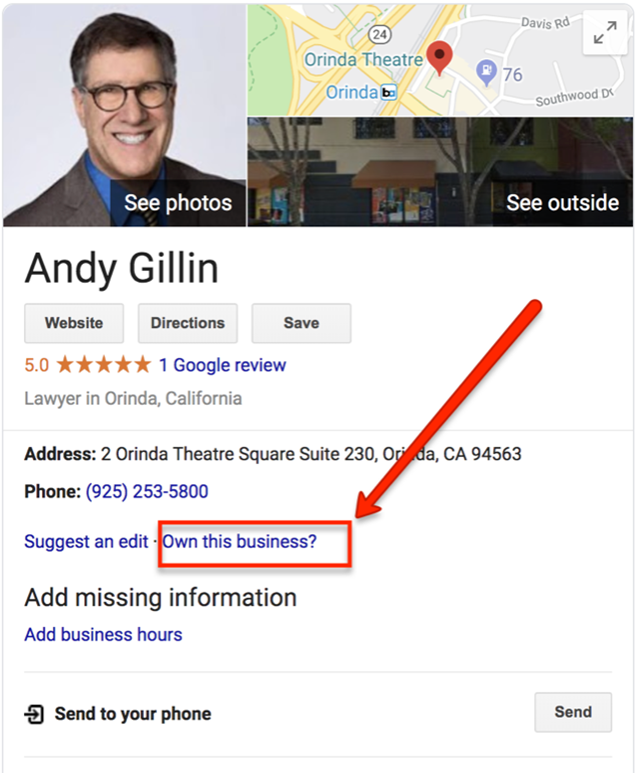
Here are the steps you need to take to get a hint:
- Go to https://business.google.com/create
- Enter the firm’s name and select their listing from the drop down
- Click “Next”
Then, if the listing is claimed, Google will give you a hint as to the email address of the entity that claimed it.
Creating a New Google Business Profile
If you don’t already have a listing, and you’ve conducted the searches above, you can move on to creating a new business listing for your law firm. Customers will not be able to see the listing until it’s approved. Follow these steps to create a new listing:
- Go to google.com/business and select “Manage now”.
- Sign in using your Google credentials (or create a new account).
- Enter the name of your business.
- It will ask you if you want to add a store or physical location where a customer might visit. The answer to this question should be yes.
- Next it will ask you to enter the full address of your business. This is where they might send a postcard.
- The next step will ask you if your business shows up in the list provided. This is Google’s attempt to prevent duplicates from being created. If you see your business in the list you should select it. If not, you can move forward by selecting the option “none of these”.
- On the next step, Google will ask if you serve customers outside of your location. While many personal injury law firms do, the purpose of service area was not really intended for this. Select the option that’s best for your firm.
- In the next section you will need to assign a business category. To start, enter the most appropriate category for your law firm first. The most appropriate category for your firm will be: “Personal Injury Attorney”.
- The next page will ask for your contact phone number and website URL. The phone number should be your office phone number and the website URL should be the local landing page you decided on.
- You will now be presented with options to verify your listing. At this point, you should try to claim your listing using one of the options they provide. In some cases, only the “snail mail” option is available, meaning the verification postcard will arrive in five–ten days.
Pro Tip: The postcard verification method expires so you will want to enter the code as soon as you get it.
Pro Tip 2: If you use an online phone service like CallRail, you may not be able to get the auto verification text messages. In this case you will need to wait for the postcard.
Now that you have a Business Profile, it’s time to optimize it for ranking and lead generation.
In this section, we will go through the different optimization steps you need to take to make your GBP listing perform exceptionally.
To access your profile and make these edits, login to your business at: Google.com/MyBusiness and open up the appropriate verified location.
Business Name
This should be the business name that accurately reflects the name of your business license and signage as we discussed in detail in the “Choosing a Name” section.
Pro Tip: Don’t stuff keywords in your business name. You risk suspension! (But weigh the risks!)
Business Categories For Your Firm
Setting up the proper categories for your business will ensure it has the ability to rank for keywords that are most important to you.
Here are the categories available for personal injury law firms at the time of this writing:
- Personal Injury Attorney
- Trial Attorney
- Attorney
- Lawyer
- Law Firm
Categories will change over time. More categories are typically better.
Here is my advice and guidelines on choosing categories for your law firm:
- Use as many categories as you can that will drive relevant business to your firm. Although Google’s guidelines state “Choose the fewest number of categories it takes to describe your overall core business”, real world testing has shown us that more categories will help your firm rank for more keywords. Here are some example categories for a PI firm:
- Personal Injury Attorney, Trial Attorney, Attorney.
- Use the most relevant category first.
- Custom categories are not allowed.
- Changing categories may cause the need for your business to be verified again (although I have not seen this often).
Some advice out there will say you should limit the number of categories.
A word of advice: Unethical marketers or competitors may go in and change your business category to something irrelevant such as “Law bookstore”. Sometimes these edits are auto approved. If your rankings tank overnight, you should check your category.
Business Address
It’s very important that your business address is accurate. Your business address should be the physical location where your office is. It should also be somewhere you can get US mail.
This address will be used to build citations for your business and it’s important that this information is consistent.
Typically, when entering the address, the best format is to put your address on line one and your suite number on line two.
Phone Number
In the old days, we used to stay away from tracking numbers because it would mess with the data accuracy. Google business profiles now provides a way around this with the GMB platform.
Whether you have an established law firm or a new one you, can keep your old phone number and track GMB calls.
To do this you will enter the number you want to track calls from in the “Primary Number” field in GBP.
You will then add your original local landline number which may be associated with old citations by clicking “add number.”
Profile Short Name
This new feature allows you to select a shorter name for your business that can be searched easily.
Example: @law-firm-name
Early feedback from this rollout shows that businesses who stuff keywords in the short name of their business have gotten their listings suspended.
For now, I recommend using your brand name.
Service Areas
We don’t typically use service areas, although investigators for personal injury attorneys will commonly visit a person’s location.
I have not seen a ranking benefit from using this and adding additional city locations or zip codes. Sorry, this is not a secret ranking tactic.
Business Hours
The Google guidelines say you should “Provide your regular customer-facing hours of operation. If applicable, you may use your current seasonal hours as your regular hours. You may also specify special hours for particular days, like holidays or special events.”
Google really wants you to keep business hours to when the office is physically staffed.
You will see many law firms set their hours to “24 hours” because they answer the phone 24/7.
This is a risk that some law firms choose to take. If someone reports your listing, your business hours can be changed to what is reflected on your website or your listing could get suspended.
Special Hours
Google Business Listings also offers a place to enter special hours for holidays. I recommend you enter your holiday hours here.
Website URL
You will enter your firm’s landing page URL under the website URL. For many single location businesses, this is the homepage. If you have multiple locations, I recommend creating a specific landing page for this.
Pro Tip: If you change or update the URL in Google business listing, it will force Google to crawl the URL. This usually happens within minutes. If you make any on-site changes and want Google to see them, you can simply re-renter your URL and hit save for Google to crawl it.
Services Section
This is a newer area in the profile management. As a law firm that offers services to clients, this is a great place to explain what you do.
While I have not personally seen great ranking gains from this, it’s here for a reason. I suggest adding your practice areas and descriptions here to help Google understand your law firm better. To do this:
- Click “Add Section”
- Under “Section Name” label it “Areas of Practice” or “Cases We Handle”
- Put the specific practice area under item name
- Write a detailed description of your practice area
- Add as many as you need to accurately list the services of your law firm
Accessibility
This section is for physical features of the location. Simply select the options that are relevant to your premises. Here is a list of currently available accessibility options in Google Business Profile:
- Accessibility
- Wheelchair access elevator
- Wheelchair accessible entrance
- Wheelchair accessible restroom
- Amenities
- Restroom
- Unisex restroom
- Highlights
- Veteran led
- Women led
- Planning
- LGBTQ friendly
Business Description Section
While we have not seen this field have an impact on rankings, it is a great place to tell users about your business.
Typically, we recommend a 250-word description since that’s the maximum word count of what will appear in the knowledge panel.
Although its placement isn’t very prominent, it’s worth making sure you cover your unique value propositions and why potential clients should call you.
Opening Date
This field is used for setting the date when your firm’s office opened for the first time.
Beware: Shady internet marketers have used this to move open dates to the future. This causes the listing to disappear until the opening date passes. **This may be fixed now.
Photo Optimization and Uploading
This is where you should add the photos of your law firm. Below are the categories that are currently available, as well as the type of photos you should upload to them:
- Logo – this should be your law firm’s logo
- Cover – this is the image that will display in search results when people search your business
- By owner – photos uploaded by owner
- By customer – photos uploaded by the customer
- 360 – three hundred and sixty degree virtual tour of your business, available through a paid program using Google’s trusted photographers
- Video – videos you have uploaded
- Interior – photos of the interior of your office
- Exterior – photos of the exterior of your office
- At work – people and team members at work in the office
- Team identity – pictures of staff members
Naming Your Photos Before Uploading
I believe it’s worth renaming these photos using important keywords. Although Google appears to strip file names when they upload images, I used to be able to get listings to rank for keywords using this tactic. Maybe old habits die hard.
This is especially important for your practice area photos. Here are a few best practice tips.
Best Practices
- Use hyphens to separate words (e.g. personal-injury-lawyer.jpg)
- Use relevant keywords but don’t spam
- Each photo should use a different keyword
Example Photo Optimization:
Img_001.jpg should be renamed to san-jose-car-accident.jpg
Products Section
Google has now rolled out a products section in your Google Business Profile. This is important because if you offer products, you will have the added benefits of having your products show in the local panel for your business and the ability to rank for more product-based keywords.
This is also a section where you can reinforce relevance for your listing.
For personal injury law firms, I recommend adding your practice areas as products with pictures here. This is because they are given prominent visibility where as “services” are not in your local listing for brand searches.
Services Section
The services section is also a new section in Google Business Profile that should not be ignored. While it’s more relevant for PI firms to use this section, it does not carry the same visibility as products do.
You should add each of your practice areas and injury types you handle to this services list along with a short description.
Verifying Your GMB Listing
If your listing is not already verified, you will have to go through a verification process. Typically, Google will ask you to verify the listing in one of three ways:
- Postcard – they will mail a physical postcard with a code you will have to enter online
- Text message – they will send you a text message with a code
- Phone call – they will call you with a code you need to enter online
Important Note: If you are using CallRail or some other call tracking service, the text message or phone call option will not work if the numbers have been ported over to CallRail. You will have to go with the postcard verification option.
Once you get your code, you will enter it online to verify your listing. At this point your listing is now verified and will start showing up in Google search results within the next few days.
Building Relevance and Authority to dominate Local Search Over Time
In this section we are going to cover what you need to know to build relevance and authority to dominate local search over time.
Continue to Upload Images
Uploading and optimizing images to your Google Business Profile on a regular basis needs to be at the core of your local SEO strategy.
Businesses with more images get more visibility.
When I first started in SEO, images were primarily understood by the file name and alt text. Now Google can actually view the images and reach a conclusion about what that image is showing.
With these major increases in technical abilities, it’s important to adapt. In my opinion it’s best to use your own photography. Otherwise you’ll be using images that every other personal injury lawyer downloaded from the same stock photo website.
All photos you add to your Google Business Profile listing should be optimized using the guidelines we covered above.
As a personal injury lawyer, here are several types of images you could upload that would help establish relevance for your firm:
- Images of accident types
- Images of injury types
- Locations of accidents
- Local hospitals
- Pictures of your office and staff
Take Advantage of Questions and Answers
Google Business Profiles now show a public facing questions and answers section where people viewing your listing can ask a question that will show up in your local listing.
At the time of writing, most of these go unanswered by law firms. Using this section of GBP is a good way to stand out from your competition and make information more accessible to potential clients.
This also helps to reinforce relevance.
The biggest problem with Questions & answers for GBP is that other Google users can also provide answers. This opens the platform up to a little bit of spam and potentially inaccurate answers. That’s another reason that these should be closely monitored.
To take advantage and optimize for Google Questions & answers, start by creating a list of the top five questions potential clients ask you.
Once you have the questions, you should develop thorough relevant answers that will help you stand out from your competition.
Here is how you can do this:
- Find your GMB listing live in Google Search Results (you can search brand name + location)
- Scroll down to the “Questions & answers” section
- Click “Ask a question” and type the question
- Respond to the question when you are logged in to the owner account.
Respond to Reviews
One of the most important yet ignored areas on Google Business Profile is responding to customer reviews.
As a general rule-of-thumb, you should respond to all reviews posted for your law firm regardless of if they are good or bad.
Many people are more willing to be aggressive behind a keyboard, so if it’s ever possible to get the upset person on the phone, try to resolve their complaint and they may be more likely to change their review from a negative to a positive one. Still respond to the complaint online, owning up to mistakes and noting that you have resolved the issue offline.
Let’s look at an example.
Let’s say that you receive this negative review for your law firm: “[Law Firm] was very hard to work with and never answered my calls.”
Your response to a negative review should acknowledge their frustrations, offer a solution, and take the conversation offline.
Here is an example of a good response:
“[Client Name], I am sorry that you had this experience with our firm. We are constantly striving to be the best law firm and it’s clear we let you down. I would like to personally make this right. Please call me at xxx-xxx-xxxx or email me at xxxx@xxxxxx.com so that I can rectify this situation.”
The above response effectively owns up to the mistake, offers to help the client, and takes the conversation away from a back and forth on a public forum. It also shows that your firm cares about their clients and that you would be a good business to work with.
Remember, when it comes to reviews, there are two types of people. One type reads the positive reviews first, while the other type reads the bad reviews first. How you represent your company online and respond to customers will either help or hinder your online presence.
Citations and Off-site Optimization
After your GMB listing is live it’s important to build citations for your law firm. At the very least it’s essential to have your business name, address, and phone number correct on the data aggregators as this is how information spreads. While the value of citations are greatly diminished in 2020 I’m a firm believer you should show up (and show up well) anywhere your potential clients are looking for you.
Citations are your business name, address, phone number, and website details listed on directory websites like Yelp, FindLaw, or Avvo.com (citations are also commonly referred to as NAP [name, address, phone number], directory listings and local listings).
There are two types of citations which include:
- structured citations – this is when your NAP shows up in a structured list format like Yelp or FindLaw;
- unstructured citations – this is when your NAP shows up at the end of an article, blog, or press release.
While the importance of citations has been greatly reduced over the years, I still believe they’re important for local rankings for mainly two reasons, those being:
- you want to be anywhere a potential client is searching (increasing your share of search);
- they provide a little bit of link equity (minimal).
Should You Use Local Listing Management Services Like Yext? No!
There are many local listing management software companies out there that claim to update and add your business to the top business directories, typically for a monthly fee.
These companies, like Yext and Synup, are legitimate and can do this for you, but if you don’t plan on moving your office is it really worth the cost at $500–$600 a year?
“In my opinion the answer is no. These people are really just ripping you off” – Casey Meraz
I think it’s always best to build these citations manually (or find a company to do it manually), unless you plan on moving regularly (which you should not as that can easily create data confusion and tank your rankings).
Here are a few companies I would recommend you reach out to if you want someone else to handle this part. If not, we will cover how you can do this yourself in the next section.
Recommended companies for citation building:
- Juris Digital – this is my company and we charge $5.00 per citation
- Whitespark.ca – a Canadian company that typically charges around $5.00 per citation
- Brightlocal.com – a Local SEO tool company that charges around $2.00 per citation
What Citations Are the Most Important?
The most important citations for your law firm are going to meet one or all four of the following criteria:
- They are a data aggregator, which are large data companies that collect business data and resell it to smaller directories. It’s important your information is most accurate at the top aggregation companies. Foursquare was recently added to this list after a study from Whitespark.
- They are a commonly used nationwide directory or website (think Yelp and Facebook)
- They are legal related (Think Avvo, FindLaw, Justia, Hg.org, etc.)
- They are local to your town (Chamber of commerce, Bar associations, city directory, etc.)
To help make your life easier, I have created a top list of citations you can focus on for points #1 and #2.
You can use my citation building search method to find new opportunities that will help you with #3.
Important Things to Remember Before Building Citations
Based on experience, I can tell you these are the most important things to do when listing citations:
- Fill out profiles completely. Make sure you have your logos and firm photos ready. The more filled out a profile is, the more unique it will be and the more likely it will be to drive new business to your law firm. Profiles should be filled out 100%.
- Pay close attention to the categories on the website: don’t settle with one. If you are a personal injury lawyer, some websites may also allow you to add secondary categories such as Brain Injury Lawyer, Wrongful Death Lawyer, etc. Expanding your categories will help your listing rank for more keywords.
- Don’t worry about unique descriptions on each citation. It seems to be more work than it’s worth.
- Pay attention to website links. Website links on these citations should go to the page your Google business profile is connected to. These count as backlinks although they may not make much difference (since every business has a link from them!)
- See what other links are offered on the citation website. Do they also allow you to link to your YouTube channel or Social Media profiles? Link to these and don’t skip over them.
- Avoid duplicates. Before building a citation, search the directory to make sure you don’t already have one built. Duplicate citations can cause data nightmares which are hard to clean up.
- Accuracy is important. Having a citation with an incorrect or old address, business name, or phone number not linked to GMB may cause data confusion. Furthermore, this data could be scraped and spread across to other websites, so a potential client may struggle to contact you. Make sure your information is accurate, and update citations with incorrect information instead of creating new ones.
- All citations should be built under a single email address for easy tracking and management. It’s best to use one on your domain in case it shows up as the point of contact email, but you can also use a Gmail or other email address.
What Citations Should You Build for Your Law Firm?
Luckily for you, I have done a lot of the leg work and created a list of the top citation directories in the United States for law firms, which you will see below.
You can use this guide to simply visit the citation website and fill out the information for your business listing.
Start with the data aggregators. These include:
- InfoGroup
- Neustar Localeze
- Infogroup
- Foursquare
- Here is our list of the top legal directories and citations
- Finally, you need to focus on local citation opportunities. Your #1 tool for finding local citation opportunities is Google.
To find state, local, or county citation sources, simply conduct the following Google Searches and record the information in a spreadsheet.
Searches to find city specific citation sources:
- (city name) add business
- (city name) business listings
- (city name) business directory
- (city name) directory listings
- (city name) directory
- (city name) chamber of commerce
- (state name) business listings
- (state name) business directory
- (state name) directory listings
- (state name) directory
- (state name) chamber of commerce
Wherever you go about creating or updating a citation, it’s important that you track the most important information.
This will ensure you can edit it again in the future and check that it went live.
As a bare minimum, here are the fields you should track in a spreadsheet:
- Directory website – the name or URL of the website
- Listing URL – This should be the URL of your live business listing
- Username – The username you created to log in
- Password – The password you created for the directory website
- Date – The date you added the listing so you know when to check back
Once You Build Them, Make Sure They Are Indexed and Actually Helping You
So, now all of your citations are live? Great work! Citations only help how well your website ranks if Google knows about them and adds them into their index. If Google is not indexing your company Yelp page, it will not be doing you any favors.
I tested how well Yext citations got indexed, and after 3 months, only around 20% of them were seen by Google.
The same thing can happen if you build them manually. Luckily, there is a workaround for this.
A quick disclaimer: I would try the following method in small quantities of links. Don’t add 1,000 links to a page and expect Google to crawl them. Furthermore, an influx of recognized links could appear unnatural and spammy, so be careful.
- Create a page on your website or older blog post. You could title it “Other places to review us on the web” or something similar.
- Add the links to the citations not showing up in Google’s index. [If you’re not sure which ones aren’t showing, you can copy and paste the citation URL into a Google search and see if the result shows up.]
- After the page is complete, open up Google Search Console and enter the URL of the published page on your website that contains links (not just text) to the citations that are not indexed.
- Select ‘Request Indexing’ then wait a few days and check the URLs to see if they’ve made it into the index. Sometimes it may only take minutes!To learn more, read my article on if your citations are even indexed
Bing, Apple Maps, BBB, and Yelp
When it comes to listing your business, it’s important that you are ranking in the places where potential customers are looking for your law firm.
There are four additional websites that you will want to prioritize your data on before moving onto the general citations for your business.
As with citations you want to be sure to add as many relevant categories as possible to your business listings.
Bing Places for Business
Being listed on Bing Places for Business is very important to the success of your local campaign.
While only a small percentage of traffic goes to Bing, some people have it set as their default browser. Ranking in Bing can provide some new leads for your law firm.
Bing now allows you to import your business details from your profile, which will help keep the information accurate and consistent.
You can find and manage your listing online at BingPlaces.com.
Make sure your profile is 100% filled out.
Apple Maps Connect
Sometimes when looking for a business, potential clients will use their Map app. We have you covered here in Google Maps, but what if they are using the Apple Map app? The business data from Apple Maps typically feeds via Yelp. However, it’s still important to make sure your business is listed on Apple Maps.
You can do this through Apple Maps Connect which can be found here.
Once logged into this website you can see what data (if any) Apple has on your business.
To use this simply sign in with your Apple ID. From here you can click “Add a place” in the upper right corner and go through the claim or addition process.
Once you claim your Apple Maps listing make sure to optimize it and fill out as many details are you can.
Better Business Bureau (BBB)
Although I don’t typically recommend paid BBB listings, showing up on their business directory and having a positive rating is a good trust signal.
If you are a member or have the ability to incorporate their trust signal into your design, I do recommend using this. It is a well-known logo and can increase consumer trust.
You can find out if you have a listing or create a listing at BBB.org.
Different chapters run these, so the information requirements might be different by region.
Yelp
Yelp is an important one to fill out because not only will your star rating on Apple Maps populate from Yelp Reviews, it also ranks highly for many important searches, such as “best car accident lawyers” and “personal injury lawyers near me”.
It’s important that you set up a business account with Yelp and keep the login readily available. From time-to-time, clients may even try to contact you through this platform, even if you’re not paying for their ads.
You can find out how to claim your profile and manage your business account here.
If you’re wondering if Yelp ads are worth the money, I say don’t waste your time. You can read my latest study on Yelp ads here:
Review Strategies for Lawyers
With so many potential clients researching law firms before making a hiring decision, it’s essential that your law firm has a strong reputation online. Reviews are a big part of this.
Not only are potential clients using this information to decide whether they should contact you, they are also a local pack ranking factor. So these need to be a key part of your Local SEO strategy for your law firm.
What Does a Natural Review Profile Look Like?
A recent study from Spiegel Research Center aimed to determine what average review rating instills the most trust in potential customers.
This research focused on higher price items since purchase decision making is different for lower prices items. The results were surprising:
“Is five stars ‘too good to be true’ in the eyes of consumers? According to our research, it is. Across product categories, we found that purchase likelihood typically peaks at ratings in the 4.0–4.7 range, and then begins to decrease as ratings approach 5.0.”
This makes a lot of sense to me because when I’m shopping, I personally look at the bad reviews and see how a company responded to them. Real companies make mistakes.
I’m sharing this information in the hope that you understand that while five stars may not be all it’s built up to be, you also need to make sure you’re getting consistent good reviews. If you only have five reviews and two of them are bad, you will have a poor rating well below the 4–4.7 range.
Reviews need to be a part of your culture. If you answer the phone harshly and hang up on people, it doesn’t matter how much internet marketing your firm does. The word will spread online and your potential clients will be choosing other law firms to work with.
Where to Focus on Reviews
Getting reviews where nobody is looking is a waste of resources. Where you need to get reviews depends on what review websites are ranking for your brand or for your important practice areas.
Once you know your most important keywords, these are easy to find. Start by conducting the following Google Searches for your priority keywords in your geographic area:
- [Your Law Firm Name] Reviews
- [Lawyers Name] Reviews
- Best [Keyword]
Make a list of the websites that consistently show up in the top three positions and on the first page. If they are websites where you can get reviews, then these should be a priority.
Outside of the websites you’ve identified in the above steps, you will also want to focus on Google Business Profiles and Yelp, in that order.
Important Information About Reviews
Google reviews are typically easy to get while Yelp seem to be the hardest. This is because Yelp heavily restricts reviews and upholds certain rules, such as you can’t solicit reviews for Yelp (that’s because they want them to be all “natural”).
While many people have found workarounds and gamed the systems in the past, attorneys have more restrictions than most. Those strategies typically backfire, resulting in reviews that are filtered or listings that are suspended.
Reviews are very important because having review text that mentions a keyword can help your business rank for that keyword. Notice the example below that showcases a review right in the 3-pack.
Pro Tip: The easiest reviews to get will be Google Reviews. Anyone with a Gmail address can be sent a link that opens the review window. We will discuss this in the “How to get reviews” section.
Here are a few important considerations you should be aware of:
- You cannot pay people for reviews (nor offer a discount)
- Most platforms do not allow review gating where automated emails only allow satisfied customers to leave reviews
- You should not setup a review station in your office. Reviews coming from the same computer or office location are a huge red flag
How to Get Reviews
Getting legitimate reviews is difficult and, in some cases, you might be limited in the action you can take according to your State Bar. Below are proven strategies that have been extensively tested.
The easiest way to get reviews is to go after people who have already used your services. While Google does not allow review gating, the following process is a solid strategy to get an influx of reviews:
- Start by curating a list of happy customers you have worked with over the years from your CRM.
- Review the list with your staff and identify the clients who would be tech savvy enough to leave reviews.
- After the list is curated it’s essential that the person who had the best relationship with the client call the client and ask them if they would be willing to leave a review. Feel free to add a more human element to your script. Example script below: “Hello is this Mr. John Doe? Hi this is [employee] at [law firm]. How have you been? The reason I’m calling today is that I’m up for my annual review and I could use your help. One of the factors my boss uses to judge my performance is by the reviews that mention my name. Would you be able to help? Ok great! Is XYZ&gmail.com still your email address? If so, I can send an email right after this call. All you will have to do is click the link and leave a five-star rating with a review. If it makes it easier, I can write a sample review for you.”
- At this point you will have your answer on whether they are willing to leave the review. The problem is getting them to actually do it. You can make it easy on them by offering to write a sample they can use in the review. A good example of this for a car accident client is below: “[Staff Member] was the best to work with and always there for me after my car accident case. I wouldn’t hesitate to recommend [Law Firm Name] to my friends or family if they needed a personal injury lawyer in [city].
Pro Tip: Keywords in actual client reviews can help your local listing rank better for important keywords. Notice the keywords highlighted in bold above.
- Use the Juris Digital Google Review link generator to find your business and send clients the link here:
- If they use Gmail, the link will open your business listing in a window where they can copy and paste your sample review or amend it as they wish.
- Follow up with them every two days (the first week), once the second week, once the third week, and the once monthly until the review is posted.
- Be helpful when people call in (even if you’re not the best person to help them, point them in the right direction).
One of the most effective review techniques I have seen by law firms is simply listening to new callers and being as helpful as possible, even if they don’t become clients.
By training your staff to help everyone who calls in regardless of whether they’re right firm for them or not will build a stronger brand.
Here is an actual review for RMD Law, a personal injury law firm in Irvine, California, received after using this method:
“INFO:
I contacted them to get information about a collision case that I am currently trying to settle.
I was rear-ended, and you see that the other insurance party is not giving a fair offer.
John spent his valuable time with me, educating me on the procedures as well as through the process of the importance of getting with an attorney to help you. Long story short, he explained to me the benefits and the increased settlement offer that you could potentially gain if you knew within attorney from the start.”
In the example above, the attorney knew that he was not going to take the case pretty quickly after talking to the client. However, instead of hanging up on him, he offered the caller something very valuable. This was his time and expertise.
Many attorneys do this every day, but they don’t do the most important thing, which is asking for a review. By simply collecting the caller’s name and email after providing professional guidance, you can ask for a review and send a follow up reminder.
Deliver Settlement Checks
One method we tried years ago for a Californian personal injury law firm was to deliver settlement checks to the clients once their cases were settled.
In these cases, we would send out an investigator with an iPad connected to cellular data (as a backup) and ask the client if they would be willing to leave a review for us on their home computers. If the client did not have a computer, we had an iPad ready.
Get Reviews By Hosting Community Events
Does your law firm host any free community classes? We will discuss this review building option in more detail in the link building section, but it allows you to kill two birds with one stone.
Let’s say, for example, your personal injury law firm decides to host a class at your office once a month called “Safe Teen Driving Habits” where your firm provides tips, tricks, and practical advice for one hour a month to help keep the roads safer.
You could ask the attendees to rate the firm and perhaps leave a review based on their interaction with your law firm.
The easiest way to get reviews is to go after people who have already used your services. While Google does not allow review gating, this is a solid strategy to get an influx of reviews.
Link Building for Lawyers
In 2019, link building is a fundamental requirement for law firms to be successful in ranking for competitive keywords. Link building comes with a lot of different names. You may have heard it referred to as “backlinking,” “linking,” or a variety of other terms or phrases.
What Are Backlinks?
Backlinks are links from other websites that link back to yours, which act as a vote of confidence for search engines because getting links from authoritative websites is not easy to manipulate. You have to earn them. For example, CNN.com is not going to link to just anyone and the webmaster has to make the change. Having a strong link profile is essential to ranking in competitive areas.
What Is Link Building?
Link building is working towards getting other webmasters to add these links. There are many different types of links you can get, and the quality sometimes depends on how easy they are to get.
Here are some examples of links a link builder might go after:
- Directory listings – Every law firm can submit their business info and get this link. They are quick to approve and a single directory website might have a million outgoing links, so they are not the most valuable for link equity.
- Outreach link building – A link builder identifies a website referencing a study that you published on your website. After this is found, the link builder reaches out to the webmaster and politely asks that the website links to the source material on your website. This link was harder to get and not many people have it. It could be more valuable.
Are More Links Better?
I wanted to dedicate a whole section to this because it’s so important. When you are link building you need to focus on Quality over Quantity.
100 directory listing links that everyone can get are not as powerful as one link from Trust.org.
We will address how to find the best links, but remember that you only want to focus on quality links.
Not All Links Are Created Equal: Good Links vs. Bad Links
The problem with link building is that there is a lot of terrible information out there from people who don’t really know anything about SEO for law firms.
Here are some things that you should know about links:
- Domain Authority (DA) – this is a bad metric that people pay way too much attention to. Domain Authority is a metric created by Moz.com that has good intentions but, by itself, means nothing. Websites with 1,000,000 incoming spammy links can have a high DA and lead your website to a penalty if you get a link from them. Additionally, a low DA website that is locally relevant may provide greater value than a website with a much higher DA. In addition to this, you might find that Facebook has a 100 DA when this link won’t help you at all. The bottom line is; don’t use DA as a link quality metric.
- Exact Match Anchor Text and Anchor Text Guidelines – back in 2008, we used to build links with anchor text that was an exact match to the keywords we wanted to rank for. This was easy for Google to catch onto, and they started penalizing websites for doing this. In 2019, we need to be focused on brand first anchor text. Typically, if I have control over the anchor text, I am going to follow these guidelines:
- No two anchor texts will be the same;
- 20-60% may be brand related keywords;
- Don’t use the exact match keyword, instead turn it into something else. (e.g. ‘Car accident lawyer’ could be ‘Attorney smith is a car accident lawyer at firm name’).
- .Edu Domains – I’m sure you have heard how powerful these can be. But don’t get too excited. These links are treated the same as everything else. A link from JurisDigital.com is going to be more valuable than a link from a buried page on a university website.
- Number of Outgoing Links – it’s common to adopt any old link building tactic. For this example, I am going to harp on scholarships. While we use these and they work great, sometimes the campaigns are misleading. This happens typically when you get a link from a university on a low authority page that links to 1,000,000 other law firms. This link would not be as helpful as a highly authoritative page that links to ten law firms.
- Paid Links: Semantics or Helpful? A monetary exchange for a link is against Google’s guidelines. Do not buy links or risk getting penalized. Honestly though, some of this comes down to semantics. If you sponsor an organization with money and they then decide to link to your website that is OK. You did not ask for that link in exchange for money [but in my opinion, it’s really the same thing].
Qualities of Great Links
Not all links are created equal, and there are a lot of bad links out there on the internet. Good links are:
- from websites relevant to the content they’re linking to, e.g. if you have a law firm website, getting a link from a bar association is great. This is relevant because it’s in the legal niche.
- from locally relevant websites. Example: If you have an article on your website about the most dangerous intersections, then a link from the local newspaper is great.
- follow or “nofollow” A natural link profile will have follow and no-follow links. Don’t pay too much attention to this. Example: You sponsor a local bar association event in your city and they link back to your website even without you linking to theirs.
Law Firm Link Building Tactics
Law Firm Link building tactics change from time to time, but here is an article we wrote on methods you can use to earn high quality links in 2020.
Local SEO Tactics That Don’t Work
The SEO industry is full of snake oil salesman. While I could dedicate a whole chapter to tactics that don’t work, I thought it would be more helpful to explain my thinking on how to identify bad tactics.
If you hear about a “new” tactic that can get results quickly, run for the hills. At the end of the day, you’re putting in the work to optimize your visibility the right way because you want it to pay for years to come.
I have worked with law firms that have been too aggressive and tried black hat techniques. The result every time was a suspension.
If you were to turn off the source of new leads coming to your law firm, how would you survive? Simply put, these rash decisions are poor business decisions and have no place in your firm.
Dominate Your Competition By Checking All of the Boxes
The most successful law firms I work with are the ones that understand the importance of sticking to an effective strategy and putting in the work.
The biggest problems I see getting in the way of law firms being successful online is bad advice and not putting in the work. It’s important to remember that your website is an investment and an asset. If you try and take shortcuts, you risk putting everything on the line.
How To Get Negative Reviews Removed From Your Local Profile
If you’re a law firm owner, there is nothing more frustrating than watching your business trickle down and then going to Google to find a negative review has just dropped your rating.
However, it’s even more infuriating when that review simply doesn’t make any sense and doesn’t reflect the service you provide.
For example, have you ever received a Google review like this:
“I hate these law firm ads on TV”
It’s obvious, right? It’s someone who probably has never even worked with you!
However, it gets worse. What about reviews that simply don’t help anybody?
“They denied me entry because I wasn’t wearing a mask. It should be illegal to treat customers this way!”
Again, it has nothing to do with your service but the policies of your state on wearing masks during COVID-19. Large and small businesses receive complaints like this that threaten their livelihood though it has nothing to do with the way they operate or treat customers. As an attorney SEO company, we are starting to see the Covid posts more frequently.
Google has policies in place to prevent these kind of reviews from hurting your business, and you can remove them just by knowing this simple process.
Addressing these reviews is important because they can show up on your business profile listing or Local Service Ads.
What Can You Do with Negative Reviews in Google?
Before you lose it, just laugh at these reviews. They don’t mean anything about your business, and Google knows that. We live in a strange time where anyone with any kind of opinion can leave a poor review, even when you gave excellent service and product quality. For some people, leaving negative reviews is their entire goal in life, and it has nothing to do with you.
If you ask for reviews, you’re trying to improve your business rank in Google, and that’s commendable, but you’ll likely get 1 negative review for every 5 4-star or higher review.
In other cases, the negative reviews may be a sobering reality if they all mention the same employee or faulty product that you need to fix. There are ways to respond and neutralize these legitimate reviews.
But that’s not the type of review we’re talking about. You can simply remove reviews that don’t make any sense or violate Google’s “content and review policy.”
However, inappropriate, political, social commentary, or personal rants are not allowed in Google reviews. You only have to flag these reviews for them to be removed.
Start By Reading the Guidelines
Before flagging the review, you should make sure that it violates Google’s policy. Here’s where to see if this content can be reported:
There are a few different categories for content that you can flag, including
- Spam or fake content
- Off-topic related to politics, social commentary or personal rants
- Restricted content
- Illegal content
- Terrorist content
- Sexually explicit content
- Dangerous or derogatory content
- Impersonation reviews
- Conflict of interest (hey that username looks like the name of your competitor!)
- Offensive content
If you find that the content falls into any of these categories, you can simply find the review and click the “flag” icon above it to report it.
Best Way to Remove a Google Review
You don’t want to flag a review in Google Maps as it’s not as fast as flagging the review through your Google business profile. It’s also an essential step in law firm local SEO.
To find the review, you’ll need to login to your GBP dashboard. Here’s a step-by-step guide to remove negative reviews the right way.
1. Login to Your Google Business Profile
You can simply navigate to business.google.com to load your business profile. Once logged in, locate the business profile you want to remove the review for.
2. Go to the Review Area
At the top of the page, go to the left-hand menu and select “Reviews.” You’ll scroll down through your business’ reviews and find the post you want to remove. Before removing, check that there are no responses to the negative review. If so, remove the response first.
3. Flag as Inappropriate
Once you’ve found the negative review, click on the 3 dots in the upper right corner of the review, then click the “Flag as inappropriate” link to get started.
4. Follow Google’s Prompts
Google will take you through a dialog box that asks what policy was violated. Click “Continue” and then write in your reason for flagging the review.
Google hasn’t updated these reasons to always reflect the problems with the review, so you can always select “Offensive or sexually explicit” to report content that falls into “political, social commentary or personal rant.”
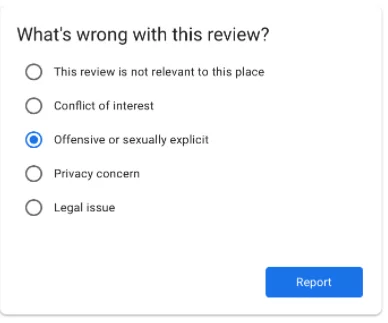
If you find that the review violated another one of Google’s policies, use that for your reason instead. This is why you should look at the guidelines beforehand.
For those reviews that don’t match any, you can still just flag as “Offensive” and click “Report” to finish.
5. Wait for Google to Review
You only need to flag the review once. Google actively and individually reviews every flag, so you’ll receive an email from Google with the status of your removal request.
This is only true if you go through the Google Business Profile dashboard, which has priority over simply flagging through Google Maps.
What Happens If Google Won’t Remove a Negative Review?
Hopefully, the Google reviewer sees your pain and takes the review down, but if not, there are a few things that you can do.
Respond to the Review and Neutralize
It’s best for a manager to respond to these reviews and slightly point out why the review is illegitimate. This is so that other readers see your point of view and understand that the negative review is unwarranted.
For example, you can use language like “We’re sorry this happened and want to make sure you have a safe experience at our location. We’re required by law to ensure that all patrons wear a mask at our law firm.”
In other cases, the negative review may be about the service or product, in which case Google may not want to take the review down if it’s a legitimate complaint. In this case, you may want to develop a professional response like this:
“We’re sorry about your experience and would love an opportunity to make it right. Please contact us at (Phone Number Here) or email the manager at XXXX@yourlawfirm.com so we can help.”
This short, quick reply shows that you’re being proactive and hopefully if you’re doing everything right, more positive reviews will push down this negative review so that it doesn’t even matter.
Get Online Reputation Management
Finally, this is the best option if you need help removing reviews and neutralizing negative threats to your business. At Juris Digital, we can help you with getting positive reviews and creating the best responses to make these negative reviews no big deal.
Also, if you need help with local or Google Maps SEO, we’re here to help. Give us a call for a free site evaluation today.
Wrapping It Up
The best SEO for lawyers is not only focusing on tactics that are new and unique, but really its about being consistent and getting the basics right. Completing all of these steps will help get your firm launched on the right foot.
While SEO for solicitors and attorneys is time intensive, it’s not rocket science. Remember that by focusing on local SEO for your law firm you will start generating high quality local leads. But don’t settle on price alone. Affordable SEO for lawyers may not translate to results. Before hiring an agency talk with their existing clients.
